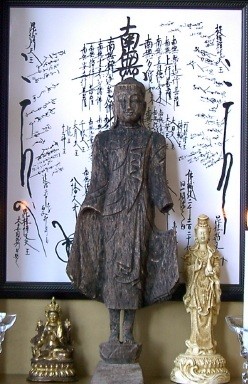Outsider poems, a mini-anthology in progress (42): From 'Theragāthā' and 'Therīgāthā' (Pali, 1st century B.C.)
Translations by Andrew Schelling & Anne Waldman

[EDITOR'S NOTE. The following – all but the commentary – comes from selections & translations assembled by Schelling & Waldman that give a sometimes startling view of the poetry created by the early Buddhist outsiders/outriders whose homelessness & wanderings might later serve as a template for the uses of a poetry outside of poetry as such. The link here between experience & poetic form is a marker of outsider poetry as we’ve come to know it in our quest for a vehicle, a book, to bring it all together. (J.R.)]
MAHAKALA SPEAKS
This lady who cremates the dead
black as a crow –
she takes an old corpse and breaks off a thighbone,
takes an old corpse and breaks off a forearm,
cracks an old skull and sets it out
like a bowl of milk
for me to look at
Witless brain don’t you get it –
whatever you do just
ends up here
Get finished with karma, finished with rebirth –
no more bones of mine
on the slag heap
KASSAPA THE GREAT
I came down from my
mountain hut
into the streets one day
to beg food
I stopped where a leper
was feeding himself
With his rotted leper’s hand
into my bowl
he threw a scrap
into my bowl as he
threw it
one of his fingers broke and also fell
I simply leaned against a wall
and ate
Taking whatever scraps
are tossed
finding medicine
in cow dung
sleeping
beneath a tree and wrapped in
tattered robes –
only a man like that
walks free in all the four
directions
only a man like that
walks free
UPPALAVANNA
Uppalavanna was stunning. She had skin the color of the heart of the blue lotus.
“Give us your daughter,” everyone begged of her father. But Uppalavanna
rencounced the world. She repeated the verses she’d heard:
My daughter
and I
married the same man!
O horror
it’s unnatural
My hair stands on end
Sensual desire is
a thick
and thorny jungle
She is visited and challenged by Mara [Death] in a sal-tree grove.
Mara:
Such beauty is
vulnerable in
this fragrant grove
Foolish girl –
aren’t you afraid of
being raped?
Uppalavanna:
Were there
a thousand rapists
No hair of mine
would stiffen or tremble
What can you do to me?
I’ve got the same magic you do, Mara
I can disappear into your body
Look!
I’m standing
between your eyebrows
and you can’t see me
COMMENTARY
by Jerome Rothenberg & John Bloomberg-Rissman
SOURCE: Andrew Schelling & Anne Waldman, Songs of the Sons & Daughters of Buddha, Shambhala Publications Inc., 1996.
Out of my mind / deranged with love of my lost son / Out of my senses / Naked
– hair disheveled / I wandered here, there / I lived on rubbish heaps / in a cemetery,
on a highway / I wandered three years in hunger and thirst / Then I saw the
Buddha / gone to Mithila / I paid homage / He pitied me / and taught me the
Dharma / I went forth into the homeless state (spoken by Vasitthi)
It’s the deliberate outsiderness, then, that marks them, a move into the margins, mirrored across millennia & continents by self-elected saints & poets. For those whose songs were later written down, the goal was a shared homelessness or else a refuge in the old/new wilderness, “to live as wanderers and seekers … in caves or woodland huts.” With that came – as it would for others, elsewhere – a turning to the common language, Pali in the present instance as a deliberately constructed counter to hieratic Sanskrit, & with that a new poetics as the sign of a new life.
Since their first gathering, the poems have been divided into two segments or books – the Theragāthā as songs (gāthā) of the early male followers of Buddha & the Therīgāthā as those of his early female followers. To the songs themselves, arranged from shortest to longest, the ancient anthologizers added short prose narratives, written with an earthiness & matter-of-factness much like that of the songs they put in context. What comes across, with little interference, is a mixture of hope & terror / terror & hope, that we might take for ourselves as the mark of all great poetry. The terror, then, in the following:
I tell you the world is blazing, blazing
the whole world’s in flames
I tell you it’s flared up
the world is shaken
your worlds are shaken
the whole world’s ablaze.
& the hope & sense of liberation:
O King, I have attained the goal
for which I went into the homeless state –
I have annihilated the fetters.
The odds have never been easy.
Poems and poetics